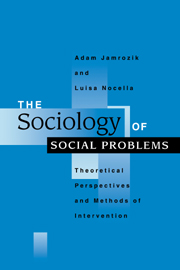Book contents
- Frontmatter
- Contents
- List of Tables
- List of Figures
- Preface and Acknowledgements
- 1 Introduction: Theoretical Perspectives on Social Problems
- 2 Contemporary Perspectives on Social Problems
- 3 Methods of Intervention in Social Problems
- 4 Social Actors in Social Problems
- 5 Challenges of Contemporary Social Problems
- 6 Social Problems in the Residualist Conversion Perspective
- 7 Inequality – The Underlying Universal Issue in Social Problems
- 8 The Social Construction of Family Problems
- 9 The Problem of Social Order
- 10 The Theory of Residualist Conversion: Does it Meet the Test?
- 11 Conclusions and Implications
- Bibliography
- Index
7 - Inequality – The Underlying Universal Issue in Social Problems
Published online by Cambridge University Press: 29 March 2011
- Frontmatter
- Contents
- List of Tables
- List of Figures
- Preface and Acknowledgements
- 1 Introduction: Theoretical Perspectives on Social Problems
- 2 Contemporary Perspectives on Social Problems
- 3 Methods of Intervention in Social Problems
- 4 Social Actors in Social Problems
- 5 Challenges of Contemporary Social Problems
- 6 Social Problems in the Residualist Conversion Perspective
- 7 Inequality – The Underlying Universal Issue in Social Problems
- 8 The Social Construction of Family Problems
- 9 The Problem of Social Order
- 10 The Theory of Residualist Conversion: Does it Meet the Test?
- 11 Conclusions and Implications
- Bibliography
- Index
Summary
An underlying factor in most social problems is social inequality. Inequality has many dimensions and is present in most societal arrangements and relationships (interpersonal, inter-institutional or personal-institutional). In the perspective advanced in this book, we consider inequality to be the fundamental and universal issue pervading most societal arrangements and pursuits, as well as the corresponding factor in the emergence and continuity of social problems. This chapter illustrates this assertion by analysing societal arrangements and processes through which the pursuit of dominant, desirable goals takes place. Examples used are from the areas of income distribution, education, the labour market, and allocation of resources on a spatial scale in the cities. (As a further illustration of these arrangements and processes, social problems in two institutionalised areas – the family and the social order – are examined in greater depth in Chapters 8 and 9.)
Our concern with inequality as an underlying factor in social problems is based on recognition of the ubiquitous presence of some forms of inequality in all known societies. It is therefore an important subject for sociological studies. Indeed, social inequality has been one of sociology's main concerns, and the issue of inequality is present in some form in any sociological enquiry. Indeed, as Bryan Turner asserts, seeking to understand the nature of social inequality has been sociologists' concern ‘since the origins of sociology itself’, and this concern is so important that it can be defined as ‘the core of sociology’ (1986:30).
- Type
- Chapter
- Information
- The Sociology of Social ProblemsTheoretical Perspectives and Methods of Intervention, pp. 128 - 149Publisher: Cambridge University PressPrint publication year: 1998



